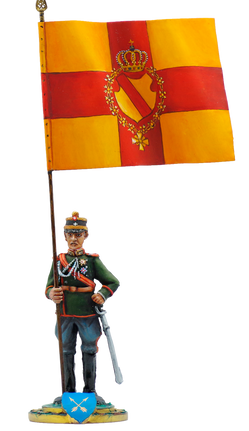
Theophil Sprecher von Bernegg
Theophil Andreas Luzius Sprecher von Bernegg (* 27 April 1850 in Maienfeld; † 6 December 1927 in Walenstadt, resident in Maienfeld, Küblis, Davos and Chur) was a Swiss officer and Chief of Staff of the Swiss Army. Theophil Sprecher was born in 1850 as the son of Landammann Anton Herkules Sprecher von Bernegg. After grammar school in Basel and Schiers, he began studying agriculture and forestry at the Tharandt Forestry College, then political science at the University of Leipzig, but abandoned this after the death of his father and devoted himself to managing his family's estate in Maienfeld. In 1871 he was elected to the municipal council of Maienfeld and in 1877 he was mayor of the town. Sprecher was a member of the Board of Directors of Vereinigte Schweizer Bahnen (VSB), a member of the Grand Council of Graubünden and, in 1881, a member of the Board of Directors of Bank für Graubünden. In 1882 he was elected Landammann of the district of Maienfeld and member (later President) of the district court of Unterlandquart. Sprecher also became a member and then President of the Board of Directors of the Rhaetian Railway and a member of the Cantonal Court of Graubünden. Together with the Catholic corps commander Friedrich Brügger, Sprecher reorganised the Bündner Tagblatt in 1895 and was a leading figure in the initially non-denominational Bündner Conservative Democratic Party. His military career was also remarkable, as he became a captain in the general staff in

1880, chief of staff of the VIII. Division in 1886 and Colonel in the General Staff in 1891. He then became chief of staff of the IV Army Corps and in 1897 commander of the 16th Infantry Brigade. This was followed in 1901 by the post of divisional colonel and commander of the Gotthard fortifications, in 1902 commander of the VIII Division and in 1905 chief of the General Staff. Division and in 1905 Chief of the General Staff Department while retaining command of the VIII. Division.

Swiss Army originated from the cantonal troops of the Old Swiss Confederacy, called upon in cases of external threats by the Tagsatzung or by the canton in distress. In the federal treaty of 1815, the Tagsatzung prescribed cantonal troops to put a contingent of 2% of the population of each canton at the federation's disposition, amounting to a force of some 33,000 men. The cantonal armies were converted into the federal army (Bundesheer) with the constitution of 1848. From this time, it was illegal for the individual cantons to declare war or to sign capitulations or peace agreements. Paragraph 13 explicitly prohibited the federation from sustaining a standing army, and the cantons were allowed a maximum standing force of 300 each (not including the Landjäger corps, a kind of police force). Paragraph 18 declared the "obligation" of every Swiss citizen to serve in the federal army if conscripted (Wehrpflicht), setting its size at 3% of the population plus a reserve of one and one half that number, amounting to a total force of some 80,000. The first complete mobilization, under the command of Hans Herzog, was triggered by the Franco-Prussian War in 1871. In 1875, the army was called in to crush a strike of workers at the Gotthard tunnel. Four workers were killed and 13 were severely wounded. Paragraph 19 of the revised constitution of 1874 extended the definition of the federal army to every able-bodied male citizen.

Sprecher von Bernegg, also known as Sprecher or often just Sprecher, is the name of an old Swiss noble family. Alongside the Salis and Planta, the Sprecher von Berneggs were among the most influential families in Valtellina and Graubünden. The family was originally of Walser descent and played a leading role in the Zehngerichtebund. From the 16th to the 19th century, members of the family held the office of Landammann of the judicial municipality of Davos 15 times. Some branches of the family still exist today. According to old traditions, the family, which originally called itself Sprächer von Bäreneck, descends from the nobleman Ursinius from Schanfigg in Rhaetia. He is said to have been named as early as 766. According to the Genealogisches Handbuch des Adels and the Historisches Lexikon der Schweiz, the family line begins in the middle of the 14th century (around 1340) with Joos Sprecher. He was a free Walser in Strassberg in the Fondeital, who died around 1390. The family name was the short form of the Walser official title for the lawyer or advocate. Fortunat Sprecher (1585-1647) was the first to use the surname von Bernegg, after Bernegg Castle near Calfreisen in the Schanfiggertal valley, which was already owned by the family in 1428. The progenitor Joos Sprecher was a wealthy landowner who already had an arrow in a red shield as his coat of arms. His sons Johann, Martin, Heinrich and Josias were the founders of four lines. Martin and Johann
were enfeoffed with Subvia Castle in Peist in 1443. From 1428, Heinrich owned the aforementioned Bernegg Castle in the front court of St Peter. The progenitor of the Clus-Maienfeld line was Sixtus Sprecher von Bernegg (* 1594; † 1629), who took part in the campaign in Piedmont as a captain in the regiment of Colonel Ulysses von Salis. His 4th generation descendant Jakob Sprecher von Bernegg (1756-1822) joined the Royal Dutch Army, as did several of his brothers. He initially served as a captain in the Bentick regiment. Later, as a major, he distinguished himself several times during the French invasion. He accompanied the Prince of Orange into exile in England. After several years away, Jacob returned to Graubünden and in 1807 married Dorothea (* 1772; † 1835), the daughter of Anton Hercules Sprecher von Bernegg and his wife Margarethe Brügger von Maienfeld. Through his wife, he came into possession of the Brügger estates with the manor house in Maienfeld. In 1811 he was granted citizenship of the town of Maienfeld. In 1814 he returned to Holland and once again entered royal Dutch service. Jacob became colonel and head of a regiment and was promoted to major general in 1818. In the same year, he was granted hereditary baronage of the Kingdom of the Netherlands. He died on 5 March 1822 while on holiday in Grüsch. His son Anton Hercules Freiherr Sprecher von Bernegg (* 1809) became Amtslandammann of the High Court of Maienfeld and a member of the District Council and District Court. In 1839, he married Clara Emilia (* 1815; † 1852), the daughter of the podestate Lucius Bazzigher von Vicosoprano and his wife Katharina von Stampa. Their son Theophil Sprecher von Bernegg (* 1850; † 1927) was Chief of the General Staff of the Swiss Army from 1914 to 1919.

Grand Duke's Standard. Flag adopted 17th December 1891, abolished 1918. Yellow flag with red cross (width 1/3 of flag's height). At the intersection the crowned lesser arms of Baden (yellow a red diagonal stripe), surrounded by the chain of the Order of Berthold.
Awards: Sash and star of the Order of Berthold the First (Orden Berthold des Ersten), star of the House Order of Fidelity (Hausorden der Treue).










